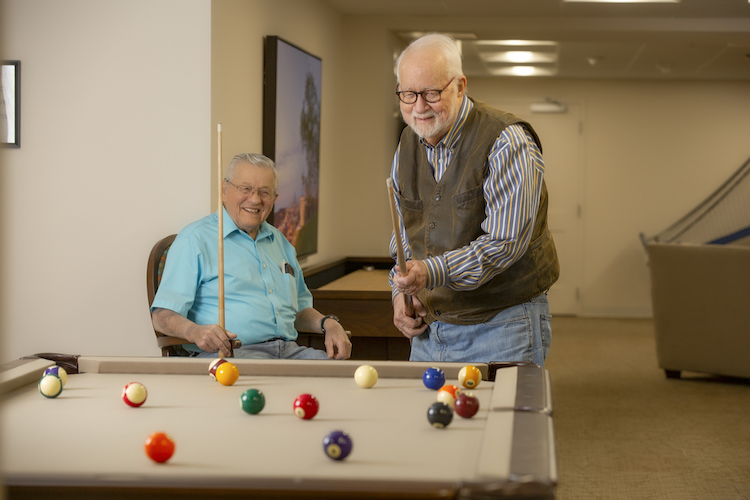The transition from complete independence to elder care in a senior living community can be challenging for more than just the person making the move. Spouses, siblings, adult children and grandchildren are all impacted by the shift in some way — and aging seniors need these family members’ love and support to make the adjustment as smooth as possible!
When their family approaches this transition with an encouraging, thoughtful attitude, the adjustment goes much more smoothly for everyone. Let’s explore this transition, and some steps to help make it a smooth shift to a new season.
Preparing Your Loved One for Elder Care
Many factors contribute to the stress and anxiety seniors feel around the concept of elder care. They may fear losing their independence — as they simultaneously feel frustrated at their inability to perform activities of daily living that were once done without fret. The shifting family dynamics are also a difficult transition, as the aging parent feels like their child is taking on the authoritative role. It’s important to be sensitive to your loved one’s feelings and needs during this complex time of change.
The hardest part of the transition is often convincing your aging loved one that it may be time to shift into Assisted Living. Having “the talk” may seem daunting, but it’s a vital first step on your loved one’s journey toward greater support and a better lifestyle. As you begin having these conversations, practice patience and understanding as much as possible, letting your loved one know that you are on their side and want what is best for them.
How to Make the Transition Comfortable for Everyone
To ease the stress surrounding a transition from complete independence to elder care, be intentional and follow these tips to help everyone feel safe, loved, and supported:
- Acknowledge your own feelings. Major life transitions can bring up plenty of mixed feelings. Experiencing a roller coaster of emotions — from grief that your loved one is getting older, to even relief and joy that your loved one will be safe — is completely normal. Give yourself space for the whole spectrum of feelings.
- Be patient. It can take anywhere from three to six months for seniors to adjust to elder care, so give them time and anticipate inevitable setbacks and difficult times.
- Visit frequently. As with any life transition, familiarity can help ease frustration. So be sure to see them as often as you can, especially in the beginning.
- Surround them with familiarity. Fill your loved one’s new apartment with family photos, nostalgic personal belongings, their favorite hand soap, and even the snacks they love! Rather than packing it with fancy new furnishings and items, help your loved one’s new home to really feel like home.
- Advocate for them. Communicate frequently with their caregivers and other staff to make sure your loved one’s needs are being met and to keep yourself in the loop on any changes that need to be made.
- Give yourself grace. You are also adjusting all these changes! It won’t be easy for you to see your family member going through all of this either, and it’s okay to take time for yourself just to process. You don’t have to be available all the time — That’s why we’re here to support you and your loved one!
Benefits of Elder Care
Although the transition phase may be difficult, the benefits your loved one will receive far outweigh this initial stress!
Safety and Security
One of the biggest reasons for seniors to shift to an elder care situation is their safety. As physical capabilities diminish or memory fades, seniors are at increased risk of falls or forgetting important daily tasks such as drinking enough water or taking their medications. Having a team of caring staff always available to support your loved one means you can rest assured they are safe, secure, and loved at all times.
Medical and Personal Care Support
Elder care is a lot for one person to handle alone, which is why it’s perfectly okay (and healthy) to either hire in-home care or move your loved one to a senior living community where they can get the daily support you don’t have the time or capacity to provide.
With on-site nursing staff and highly trained caregivers, your loved one will have all of their wellness needs met at all times in a senior living community like St. Anthony’s. Our all-inclusive care and luxurious apartments mean you can rest easy knowing your loved one has everything they need, plus so much more.
Quality of Life
As difficult as it may be for your loved one to adjust to elder care, just imagine how much happier they will be when their physical, mental, emotional, and spiritual needs are being met each and every day!
Elder care, especially when combined with senior living and a loving community, means less stress and decreased risk of crisis situations where your loved one cannot care for themselves. Just think: When you’re not worried about their well-being and safety, you get the privilege of a more peaceful relationship. Especially for adult children who may have been playing a caregiver role, you get to simply be their son or daughter once again. This can be a beautiful, refreshing and joyful season for your entire family!
If you choose St. Anthony’s for your loved one to enjoy life’s next adventure, they’ll have the added benefit of a supportive community, exciting activities, and all of their needs being met right from the comfort of their new home.
Let us Help With the Transition!
Your loved one may not require much (or any) additional care, but keeping up with the household chores and maintenance or staying on top of all the bills may be getting overwhelming. To make the possible transition to elder care easier in the future, talk to your parent or loved one about Independent Living, and contact us today to schedule a tour!




